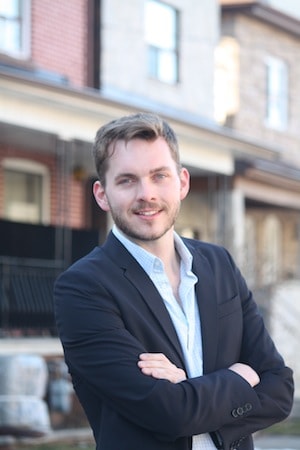He hasn’t graduated from law school yet, but Marcus McCann is already spearheading an attempt to legally overturn the accreditation of Trinity Western University’s newly proposed law school. The university intends to be a faith-based school, and will require students to agree to abstain from “sexual intimacy that violates the sacredness of marriage between a man and a woman.” Those who do not agree will be asked to leave. Trinity Western University received final approval to establish its law school on December 18, with British Columbia’s Ministry of Advanced Education granting the university permission to operate. McCann has raised over $4,600 and counting as of press time. He hopes to raise $30,000 to fund a legal challenge against the new school.

Marcus McCann, law student. PHOTO COURTESY MARCUS MCCANN
The Varsity: What started your interest in what’s been happening with TWU? What kind of activism have you been engaged with in the past?
Marcus McCann: When I came into law school I quickly found that there’s just so much about the legal profession that’s in desperate need of reform; the legal profession has such promise, and it holds itself out to be a force for good and for justice, and it sometimes falls short of that goal. I found myself getting involved in various projects to reform both legal education and the way we approach the profession more broadly.
So to return to your original question, why I got involved with the TWU fight, I just see that there is so much promise in the legal profession and we don’t always live up to those ideals, and when it comes to access to law school, criteria other than merit, like coming from wealthy families or not being LGBT, is just really fundamentally at odds with the promise of legal education.
TV: What’s driving this? What reforms are you hoping for regarding U of T Law and law schools in general?
MM: The legal profession is definitely one of those professions — and this is really applicable to the issue of TWU too — that is sort of a gateway to upward mobility for people of different social classes. This is what is so pivotal about TWU: if there are barriers that limit the availability of [legal education] on grounds other than merit, then we’re just reproducing any existing problems.
Right now we’re fighting against tuition which is approaching $30,000 a year [tuition for domestic students for the 2013-14 academic year is $29,257], which is a huge barrier for people coming to law school. And we’re also fighting for diversity at U of T Law — making sure that the school is not just a diverse and welcome place, but that we get people applying from diverse backgrounds.
TV: Let’s talk about the legal case and the Kickstarter to raise money for it. How did you get involved with Clayton Ruby’s office and the lawyers pushing the campaign?
MM: Honestly, when I first heard about this I thought that it was such an obvious wrong that I maybe didn’t need to get involved. [This was] last school year in the spring; students from law schools across the country wrote to the Federation of Law Societies of Canada (FLSC) expressing their concerns. And I was at the Pride Parade last year, for the first time the University of Toronto gay law students marched, which is kind of sweet, and we all made signs and one of them said “Say no to Trinity Western.”
And then I got a phone call from Angela Chaisson, who had heard that I was an agitator, I guess. Anyway, she was in the middle of a trial and she believed that the FLSC report was going to come out the following week and wanted to stage a protest, but she didn’t have time —so she approached me to help her out … But I also saw quickly that there were members of the legal profession and law students who were afraid to say something.
TV: Is that where the shift came from organizing a protest to crowdsourcing a legal response?
MM: Well fast-forward to the beginning of December, Angela’s in another trial and we have it on fairly good authority that [the FLSC report recommending accreditation] is going to come out, and it’s two days before final paper deadline, which is, as a law student, terrifying. Things are getting close. The report came out on the sixteenth of December and Angela texted me from court that we’ve got to get something up. So we launched it.
TV: And what’s the logic behind the end goal of $30,000?
MM: It’s $30,000, though … to be honest, for something to get to the Supreme Court, it costs. Any time you get something photocopied at the court it costs a dollar a page. It adds up really quick. There are a lot of expenses that, even if a lawyer’s working for free, still have to be covered. The $30,000 is a down payment.
TV: Does a policy like this from a single law school have much of an impact? Or is there more of a concern for its larger effect on how we teach law?
MM: Well there are two lines of argument that have been raised about the accreditation. One is that their graduates are going to be somehow inferior graduates, I don’t know if that’s valid or not; there haven’t been any graduates — there’s no evidence.
So we can put that aside and say that we have a problem at the admissions stage, which is: there are 3,000 spots at law schools in Canada and a portion of them, even if it’s only five per cent, aren’t going to be available to students who are LGBT, and I don’t see how that can be justified.
Disclaimer: Marcus McCann is the chair of the Board of Directors for Varsity Publications.
The Kickstarter page for “Say No to Trinity Western Law” can be found here.

